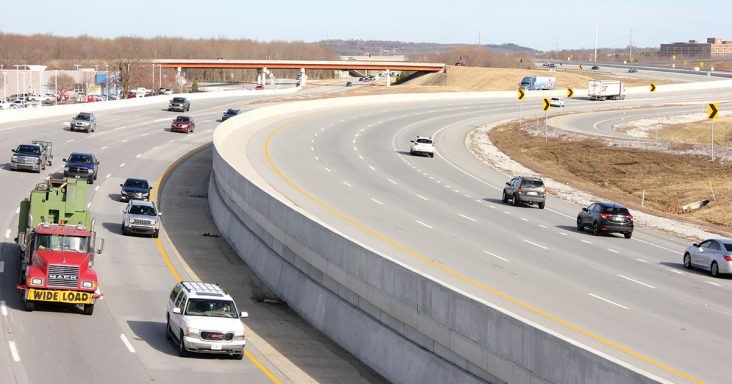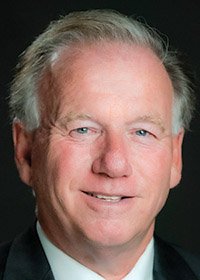November 2020 vote looms for proposed tax extension
by January 22, 2020 3:53 pm 1,705 views

Taxpayer money paid for improvements to Interstate 49 interchanges with Arkansas Highway 112 and the Fulbright Expressway in Fayetteville. Arkansas voters in the Nov. 3, 2020, general election will decide whether they want to continue to pay a half-cent sales tax for road projects.
A recent poll of likely voters shows a majority of respondents would support a proposed half-cent sales tax extension if the money it would raise is spent statewide, but the proposal is not without those who would like to see it fail.
Voters in the Nov. 3, 2020, general election will decide whether to extend a half-cent sales tax for highway projects. Earlier this year, Gov. Asa Hutchinson proposed a $300 million plan for highways, and part of the program included $95 million that Arkansas legislators approved to come from increases to the state fuel tax and vehicle registration fees and casino revenue. The remaining amount refers to the money generated by the half-cent sales tax — if it passes.
The existing tax generates nearly $300 million annually — $205 million for the Arkansas Department of Transportation (ArDOT), $43 million for cities and $43 million for counties, said Chelsea O’Kelley, deputy director of communications for Hutchinson. About the same amount will be generated if the tax extension passes.
Last month, Hutchinson and those who support the proposed extension launched a campaign for Issue 1. The ballot item would permanently extend the half-cent sales tax that is set to expire in January 2023. Under the governor’s plan, ArDOT could improve 7,300 of the 7,900 miles of Arkansas highways that carry 90% of statewide traffic daily. The program would also create about 3,900 jobs annually and generate $8 billion in economic activity, Hutchinson said previously.
Hutchinson recently said the proposal to extend the half-cent sales tax was his top priority next year.
“Not anything gonna distract me from it,” Hutchinson said. “This is a focus because it is so critical to the future of our state.”
Hutchinson spoke about the proposal at the annual meeting of the Arkansas Good Roads Foundation. He also cited a recent poll by Gilmore Strategy Group. He explained the message that generated the most support for the proposal was that the money it would raise would be spent on “highways, county roads, city streets and bridges in all four corners of Arkansas.” The poll included 800 likely Arkansas voters, and 68.6% of the respondents said the message would make them more likely to support the tax extension.
GOOD ROADS SUPPORT
Joe Quinn, executive director of the Arkansas Good Roads Foundation, said the organization supports the sales tax extension and stressed it’s not a new tax. He explained how critical the tax money is for cities and counties, and that they would lose about 30% of their road budgets if the tax extension fails. The existing tax is providing more than $85 million to counties and cities annually, and it’s also paying for the $1.8 billion Connecting Arkansas Program. Voters in 2012 approved the tax with more than 58% of the vote.

“If the tax extension doesn’t pass, you’re going to have county judges and mayors looking at their budget sheets thinking I’ve just lost 30% of my road money. Do I take that from other things? Or, do I let my roads further deteriorate? And those are tough questions. There’s no easy answer,” Quinn said. “This is about job creation. It’s about safety. It’s about accomplishing a lot without passing a new tax. And I think all of that matters a great deal right now.”
If voters approve to extend the tax next year permanently, 76% of the money will go to system preservation, and 24% would be for capital and congestion relief.
Quinn provided a list of about 50 proposed projects to be completed across the state. Northwest Arkansas projects included the connector road to the Northwest Arkansas National Airport, two additional segments of the Springdale Northern Bypass, or the U.S. Highway 412 bypass, and the widening of Arkansas Highway 112, between Fayetteville and Bentonville.
A 10-year draft plan shows statewide improvements to the existing highway system, including $3 billion for highways, $1 billion for interstates and $1.1 billion for bridges. Draft plans such as these take years to complete, and they are always evolving, Quinn said, adding that the work would be completed in all areas of the state.
“The 2012 sales tax allowed Northwest Arkansas to address critical infrastructure needs,” said Nelson Peacock, president and CEO of the Northwest Arkansas Council. “Among those were the construction of six lanes along I-49, the first section of the future Springdale Northern Bypass, and major funding toward the Missouri-Arkansas Connector. A continuation of the sales tax in 2020 will allow for similar projects across the state, boost opportunities for economic growth and improve connectability in Northwest Arkansas.”
SALES TAX OPPOSITION
State legislators approved sending to voters the proposal to extend the sales tax. Sen. Bart Hester, R-Cave Springs, voted against the proposal. He said he committed to voters in his district not to support a tax increase, and he’s honored that. Hester explained if the extension isn’t approved, taxes will decrease.
“I see the need, particularly in Northwest Arkansas, and all over the state for better roads,” Hester said. “There are needs, and the more money there is for highways, the more roads we’re going to get. And that’s certainly a good thing. You can’t get bigger, better industry, and you can’t grow without roads. I understand that portion, but as a state, we are not hurting for funds at this time. To ask the people to tax them more is just not something I’m willing to do.”
Hester said ArDOT has a budget of $7.4 million per day in federal and state money, and its existing budget should be enough to pay for needed projects. He explained it can’t take care of its existing roads because it has too many to oversee. He said a lot of the roads should be given back to counties and cities for them to take care of, while ArDOT handles the major highways and interstates.
Cities and counties can maintain roads at a lower cost because they don’t have hundreds of people employed in a corporate-style office in Little Rock operating unproductively, he said. He noted that when contractors and landowners reach out to the highway department with a question, they don’t get a timely response, and this speaks to him how it operates.
Hester also said if the highway department were to receive $300 million, it would ask for $300 million more. And if it gets that, it would need $300 million more. He said the amount of funding it receives is never enough and that he does not see it improving its money management.
Lt. Gov. Tim Griffin, who also doesn’t support the extension of the sales tax, provided the following statement:
“I agree with Gov. Hutchinson that highways should always be a top priority and deserve a long-term strategy. I have an approach that provides robust and reliable funding without raising taxes by using savings from government transformation and, like 34 other states, dedicating a portion of state general revenue to fund them. We need to address challenges like this with reform first, not tax increases.”
When asked about the details of his approach and whether they would add up to the $300 million the existing sales tax is generating annually, David Ray, chief of staff for Griffin, said he “supports even more than $300 million in additional highway funding and believes we can get there by continuing to grow the economy and pursuing a leaner, smarter government.”
